L | A
By Jim Auchmutey
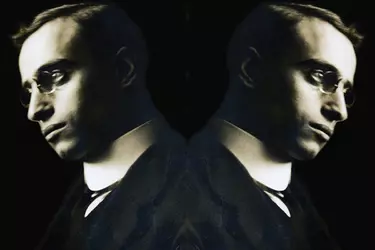
Leo Frank
One day 30 years ago, Steven Lebow, then the rabbi of Temple Kol Emeth in East Cobb County, received a mysterious phone call. The voice on the other end offered to show him a place where something terrible had occurred many decades before.
The two met at a nondescript one-story office building off Roswell Road in Marietta, a few blocks from The Big Chicken. “This is where it happened,” the man told the rabbi. “Don’t let your people forget what my people did to your people.”
Then he drove off. Lebow never got his name.
The building occupied the site of one of the most notorious lynchings in American history.
On the morning of August 17, 1915, a vigilante group organized by Marietta’s leading citizens hanged Leo Frank, a Jewish factory superintendent who had been convicted of murdering a 13-year-old girl, Mary Phagan.
She was found strangled in the basement of the downtown Atlanta pencil factory where she and Frank were both employed.
After the lynching, Frank’s body dangled from an oak tree for hours as thousands of onlookers, drunk with vengeance, gathered to celebrate and pose for souvenir pictures, before his corpse was finally cut down and whisked away to an undertaker.
Eighty years later, the tree was gone. A dentist, an accountant, and a real estate agent were doing business at the site. Lebow introduced himself to the property owner, who was aware of the history, and he readily agreed to let the rabbi place a memorial plaque on the structure.
“Wrongly accused. Falsely convicted. Wantonly murdered,” Lebow’s inscription read.
Some people, he knew, would passionately disagree with those words.
Steven Lebow thinks of himself as Leo Frank’s rabbi. Born 40 years after the lynching and raised in Fort Lauderdale, Lebow is the son of a well-known auto dealer.
He announced his interest in becoming a rabbi at age seven when he amused his parents by scrawling an admission inquiry to a rabbinical school in crayon.
Lebow learned about Frank during his graduate studies, when the trial and lynching was held up as one of the worst outbreaks of antisemitism in 20th-century America. Frank was convicted of Phagan’s murder in 1913 during a media-frenzied trial that wouldn’t stand muster in modern jurisprudence.
But it wasn’t until his plight became a national cause that Georgians turned resentful about the outside pressure to free him. Frank was a Brooklyn transplant with an Ivy League education, and much of that resentment reeked of anti-Yankee, anti-Jewish prejudice.
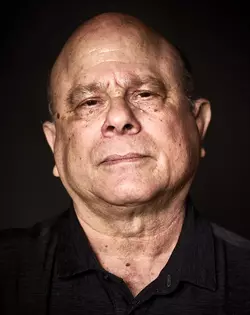
Steven Lebow
“That’s when you heard, ‘Hang the Jew!’” Lebow says, sitting in his Marietta townhouse, a mile and a half from the lynching site.
Frank was being held at a state prison in Milledgeville while his lawyers appealed. When Georgia Governor John M. Slaton commuted Frank’s sentence from death to life imprisonment, it enraged many Georgians.
Vigilantes from Cobb County went to the prison in Milledgeville, broke in, kidnapped Frank, and sped him through the night to Marietta.
Lebow has pulled out some of his personal archive about the case—files, books, vintage newspapers—so he can bound off the sofa to consult this reference or check that allusion. Almost 70, the rabbi has a short, round shape, a smooth bald head, and the relentless enthusiasm of a believer.
He took an interest in Frank after he moved to Marietta in 1986 to lead Temple Kol Emeth and realized the Reform synagogue wasn’t far from the scene of the lynching.
He started to acquire a reputation for outspokenness when he publicly opposed the Cobb County Board of Commissioners’ controversial 1993 resolution condemning homosexuality.
Two years later, as the 80th anniversary of the Frank lynching approached, Lebow received the mysterious phone call. That August, he organized and led a memorial service at the site.
“I’m not interested in litigating the lynching,” he says. “I don’t want to blame Marietta or shame the families of the lynchers. I know some of them, and they’re good people. I just want to clear the name of an innocent man.”
Lebow has led four more memorial services since the first one.
One was held in a small park off Roswell Road, across from a Mexican restaurant, where historical markers about the lynching were moved because the state took most of the original site to build improvements on I-75.
As the program began, with off-duty police watching from the periphery, a pickup truck barreled by, and a passing voice bellowed something about Jews.
The rabbi paid for the security. It wasn’t the first time he’s spent money on Frank.
Over the years, he has leased billboards, printed T-shirts, and even commissioned a custom Coca-Cola bottle with the label “Leo Frank Innocent.” “It was a promotion where you could put your name on a bottle,” he says. “They must have thought his last name was Innocent.”
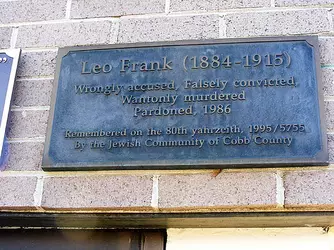
Lebow erected a plaque at the spot where the lynching occurred in Marietta; he is determined in his mission to gain Leo Frank’s exoneration
When Lebow retired in 2020 and became a rabbi emeritus, he had no shortage of hobbies to choose from.
He writes and has penned several science-fiction stories and a graphic novel. He collects comic books—thousands of them—finding solace in the fantasy that good guys always win. But recently he sold some of his comics to help finance his most demanding pursuit: winning exoneration for Frank.
He has spent thousands of dollars on the cause.
Lebow’s wife of 40 years, Madeline Sable, a real-estate agent, didn’t fully grasp his commitment at first. “That lynching happened so long ago, and there are so many injustices today,” she says. “But it’s such a stain on Georgia. This is important to him. If it weren’t this, it’d be more comic books.”
With typical humor, Lebow tells a story to show that he understands how peculiar his obsession may look to others.
Years ago, Shira, one of his two daughters, was assigned to do a school project about Georgia history. Her father suggested the Frank case and took her to the lynching site. They snapped a picture of the memorial plaque, and she pasted it on a shoebox to represent the building.
After Shira submitted the project, her teacher said Lebow may want to look at the last part of his daughter’s report, where she shared what she’d learned from the experience.
“I learned that the Leo Frank case is boring,” she wrote. “And I also learned to never listen to my father again!”
People sometimes ask Lebow if Frank hasn’t already been exonerated. He hasn’t. But the state once came close.
In 1982, Alonzo Mann, an octogenarian who had been Frank’s office boy as a teenager, gave an affidavit saying that he had seen Jim Conley, a janitor at the pencil factory, carrying Mary Phagan’s body but said nothing at the time because Conley threatened to kill him.
The Anti-Defamation League petitioned the State Board of Pardons and Paroles to grant Frank a posthumous pardon, but it declined, finding the new information insufficient to prove his innocence.
The ADL tried again and asked the board to at least apologize for Georgia’s failure to protect Frank from his lynchers. This time, the parole board agreed to honor the ADL’s request, issuing a conditional pardon in 1986.
The wording pointedly refused to address Frank’s guilt or innocence.
Lebow wants to settle that question once and for all. Around the time of the lynching centennial, in 2015, he sought legal help.
He enlisted Donald E. Wilkes, a University of Georgia law professor, who came up with the idea of writing an “extraordinary motion” to vacate Frank’s murder conviction. The person bringing the action was listed as “Rabbi Steven Lebow, Next Friend of Leo Frank.”
The motion was modeled after a handful of cases in other states in which historic injustices were remedied.
In Tennessee, for instance, a court in 2000 dismissed the 1906 conviction of Ed Johnson, a Black man found guilty of spurious rape charges. Johnson was lynched from a bridge in Chattanooga after a mob kidnapped him from his jail cell.
To bring the action, Lebow went to see one of the most prominent lawyers in Cobb County, former governor Roy Barnes, who agreed to take the case pro bono.
Barnes had been fascinated by the Frank-Phagan story since law school.
A Cobb native, he’s careful to point out that his family wasn’t there in 1915—“We were still up in the mountains making liquor,” he jokes—but his wife Marie’s was. Her grandfather was a barber who also ran a taxi service that provided transportation for the lynching party.
“There’s no question in my mind that Leo Frank was innocent,” Barnes says. “It’s one of the greatest miscarriages of justice I have ever seen.”
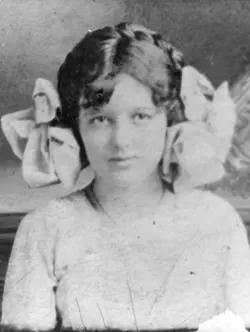
Mary Phagan was 13 when she was murdered inside an Atlanta pencil factory in 1913. A janitor, Jim Conley, was also a suspect in the case
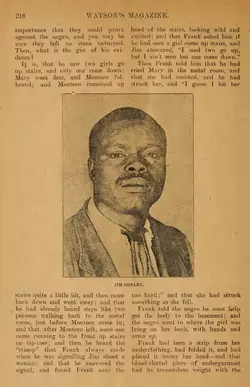
Jim Conley
He lists several reasons for his thinking, chief among them two:
The trial judge had a change of heart and died believing Frank had not been proved guilty beyond a reasonable doubt. And the lawyer who represented Conley, William M. Smith, announced soon after the verdict that he thought his client was the killer.
His opinion was based on his analysis of two notes found at the scene of the crime, notes he believed his client had hastily written to implicate others after he strangled Phagan.
Barnes was involved in the 1980s effort to exonerate Frank. As a state senator and floor leader for then governor Joe Frank Harris, he helped write the language that was sent to Pardons and Paroles in 1986, calling for a full exoneration. But the language was changed.
When Lebow approached him, Barnes thought it would be wiser to enlist the office that prosecuted Frank in the first place.
He spoke with Paul Howard, the Fulton County district attorney at the time, who suggested that the Frank conviction be part of a broader reconsideration of cases that ended in lynching.
Howard’s reasoning? Frank was an exception. More than 5,000 people were lynched in the South from the 1870s to the 1950s—more than 500 of them in Georgia alone—and almost all of them were African American.
Lebow well understands that Frank has received far more attention than most lynching victims ever have. Last year the rabbi visited the Legacy Museum in Montgomery and was moved by its dramatic lynching memorial.
He also joined the Cobb County Remembrance Coalition, a group of citizens inspired by the Alabama museum and its parent organization, Equal Justice Initiative, to document lynchings in the community.
It didn’t take long for the committee to find one. Fifteen years before Frank, John Bailey, a young Black man, was arrested for assaulting a teenager in Marietta. A mob broke him out of jail, strung him up on the square, and shot him repeatedly.
Lebow had never heard of Bailey, but last March his synagogue held a candlelight vigil for him that drew the Cobb County Board of Commissioners chairwoman and the district attorney.
“Rabbi Lebow has been a great partner,” says Bev Jackson, a former TV producer who helped organize the remembrance committee. “He’s seeking justice for a better-known man, but we don’t spend time comparing the cases. Both of them were lynched and neither deserved it.”
In May 2019, when Paul Howard announced that Fulton County’s newly created Conviction Integrity Unit would reexamine the Frank case, Barnes stood by his side at the news conference as Lebow looked on from the audience. They had every reason to feel optimistic.
But months later, the momentum started to fizzle.
First the Covid-19 pandemic struck and slowed the legal system. Then the Black Lives Matter movement ignited in Atlanta after police killed a young man named Rayshard Brooks at a Wendy’s on the south side.
Howard swiftly filed murder charges against one of the officers, a move that many saw as an act of political desperation because he was facing a tough reelection campaign—which he lost.
Then Howard’s successor, Fani Willis, became embroiled in the 2020 election case against Donald Trump and his allies in Georgia. As that prosecution quickened, Barnes advised Lebow that the Frank exoneration would probably have to wait.
The situation grew more complicated when news broke that Willis had carried on a romantic relationship with Nathan Wade, whom she had hired as special prosecutor on the election case.
As congressional and state investigators began to ask questions about her behavior, Willis asked Barnes, whom she has known for years, to represent her legally.
Barnes does not believe the election mess will prevent the DA’s office from addressing the Frank case.
“Fani and I have talked about it,” he says. “She says they know that they need to get to it. If we ever get past this Trump business, I think the district attorney’s office will give it full consideration and recommend that a court vacate the conviction. When that occurs, I don’t know.”
Barnes turns 77 this year and admits that the unresolved matter of Leo Frank “really gnaws on me.”
One reason it troubles him is that antisemitism has been on the rise. The ADL, which keeps count of antisemitic events in the United States, reported more than 8,000 of them in 2023, the most since it started keeping records more than 40 years ago.
Frank often figures in the scurrilous messaging online.
“Every White supremacist in America knows who Leo Frank was,” says Eytan Davidson, director of the ADL’s Southeast office. “Every day we see his name dragged through the mud with the worst sort of anti-Jewish stereotyping.”
Barnes encountered the ugliness a couple of years ago when the FBI phoned his office to warn about a credible death threat from a militia man with a previous conviction.
Barnes assumed the man was upset with him for removing the Confederate battle emblem from the state flag. For years after he left the governor’s office, Neo-Confederate supporters harassed and occasionally menaced him.
But this time it wasn’t the flag. “He had a picture online of me with Rabbi Lebow,” Barnes says. “He thought I’d gotten too close to the Jews.”
Mary Phagan lies buried in the Marietta City Cemetery less than a mile from Lebow’s townhouse.
Toys often decorate her grave; last Christmas season, a teddy bear in a turquoise skirt sat propped against her headstone. One of the markers, placed by a Confederate group, suggests how her murder inflamed Southern fears of change, urbanization, and Northern exploitation.
“In this day of fading ideals and disappearing landmarks,” it reads, “Little Mary Phagan’s heroism is an heirloom, than which there is nothing more precious among the old red hills of Georgia.”
Sometimes, around the April 26 anniversary of her murder, Lebow visits the grave to say a prayer. “I try to understand how it feels for the Phagan family,” he says. “No one should have to endure the murder of a child.”
Mary Phagan Kean, the victim’s great niece and namesake, wishes Lebow wouldn’t bother coming. “I don’t want him there,” she says. “He’s a liar and he’s promoting propaganda.”
Kean and Lebow have sparred about Leo Frank for years.
She first became interested in the story as a teenager, when a teacher asked her whether she was related to the girl who was killed in Atlanta. Kean started going to libraries and archives to read about the case.
When the petitions came before the Board of Pardons and Paroles, she and her family attended the hearings to oppose any sort of clemency. In 1987, she published a book about their side of the saga, The Murder of Little Mary Phagan, and plans to release a revised edition this year.
Now 70 and retired from a career as a special-ed teacher and administrator, Kean lives in Ellijay and maintains at least five websites about the case, arguing that the conviction was justified. She doesn’t condone the lynching, but she believes Frank deserved punishment.
She regards him as a sexual deviant who preyed on the girls and young women who overwhelmingly staffed the pencil factory.
She also maintains that then governor Slaton, who is usually depicted as a profile in courage because he made the politically unpopular decision to commute Frank’s death sentence, did so only because he was bribed by wealthy Jews.
Kean has attended some of the talks about the Frank case, partly to push back—and partly for another reason: She not only bears her great aunt’s name but also, when she was younger, bore a striking resemblance to her.
“I go because I want them to remember that a girl was murdered,” she says. “I want them to see my face so they see her face.”
Last year, when Kean read in the Atlanta Jewish Times that Lebow was donating boxes of Frank papers to the Georgia State University Library, she responded in kind.
She contacted David Mitchell, executive director of the Atlanta Preservation Center, who was handling Lebow’s donation, and arranged to give an even larger cache of materials to the library. She wanted her right of rebuttal to continue after she’s gone.
In the meantime, Kean is monitoring Barnes and Lebow’s efforts.
“If Leo Frank gets exonerated,” she declares, “I’d seriously think about filing a lawsuit against the rabbi for the generational trauma he’s caused my family.”
After the most recent Frank memorial, an unexpected ally approached Lebow at Temple Kol Emeth: Chuck Clay, a Cobb County lawyer and former head of the state Republican Party, whose extended family included a member of the lynching conspiracy.
He offered to help with the exoneration, perhaps by talking with people who had the ear of Governor Brian Kemp. “He might be interested,” Clay says. “It’s never too late to salve a wound.”
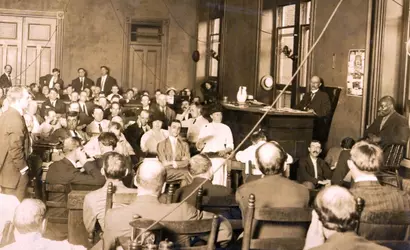
Clay has examined the case and believes the jury reached a reasonable verdict given the evidence it was allowed to hear in 1913. But evidence that would have supported Frank’s innocence was suppressed.
“There’s no doubt in my mind that if the jury had heard all the evidence, there would have been a different verdict,” he says. “There might have been a different defendant.”
The historical consensus today is that Frank was probably innocent and that Conley, the janitor, most likely killed Phagan. But it’s hard to prove innocence 110 years after the fact, especially when the forensic evidence—not to mention the trial transcript—has vanished.
The trial was also wrapped in racial overtones. Antisemitism was at an apex (Frank’s conviction and lynching spurred the creation of the ADL). And Frank’s defenders used what one historian described as “virulently racist” language to impugn the testimony of Conley, who was Black.
Steve Oney, who wrote the definitive book on the case, And the Dead Shall Rise (2003), believes that Frank almost certainly didn’t kill Phagan.
Last spring, when Oney spoke at the Dahlonega Literary Festival, Lebow stood up in the crowd and asked him point-blank whether he thought Frank was innocent. Oney said it was a 99 percent probability.
The rabbi came away pleased that the odds were rising but disappointed that they hadn’t reached 100 percent.
“I’m glad Lebow is out there advocating for Leo Frank,” Oney says. “But I wish he could see more of the shades of gray. I do admire his tenacity. He’s never going to let it go.”
Even if Lebow and Barnes succeed—if the state pardons Frank or a court vacates the verdict—Oney says that wouldn’t settle it. “The debate is never going to end.”
So Lebow presses on. Sometimes he’s excited by the prospect of an exoneration. Other times he despairs and wonders whether he’ll live to see it. In one email, assessing his progress, he gave himself an A for effort but a D for results.
What had he really accomplished? he mused: Bubkis, nothing, zilch, zero.
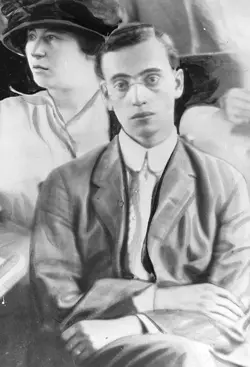
Frank’s murder trial in Atlanta received enormous media attention against a backdrop of antisemitism and racist overtones. Conley, a suspect in the murder, was the state’s star witness against Frank (left)
Whenever it all seems futile, Lebow tries to refocus. To remind himself of his purpose, he keeps on his desk a photo of Frank dangling from the oak tree.
“I take it down when our children come to visit,” he says. “They don’t need to be reminded that Daddy has a macabre interest in a lynching.”
When they leave, he puts the photo back up, in all its clarifying awfulness.
By Jim Auchmutey

Leo Frank
One day 30 years ago, Steven Lebow, then the rabbi of Temple Kol Emeth in East Cobb County, received a mysterious phone call. The voice on the other end offered to show him a place where something terrible had occurred many decades before.
The two met at a nondescript one-story office building off Roswell Road in Marietta, a few blocks from The Big Chicken. “This is where it happened,” the man told the rabbi. “Don’t let your people forget what my people did to your people.”
Then he drove off. Lebow never got his name.
The building occupied the site of one of the most notorious lynchings in American history.
On the morning of August 17, 1915, a vigilante group organized by Marietta’s leading citizens hanged Leo Frank, a Jewish factory superintendent who had been convicted of murdering a 13-year-old girl, Mary Phagan.
She was found strangled in the basement of the downtown Atlanta pencil factory where she and Frank were both employed.
After the lynching, Frank’s body dangled from an oak tree for hours as thousands of onlookers, drunk with vengeance, gathered to celebrate and pose for souvenir pictures, before his corpse was finally cut down and whisked away to an undertaker.
Eighty years later, the tree was gone. A dentist, an accountant, and a real estate agent were doing business at the site. Lebow introduced himself to the property owner, who was aware of the history, and he readily agreed to let the rabbi place a memorial plaque on the structure.
“Wrongly accused. Falsely convicted. Wantonly murdered,” Lebow’s inscription read.
Some people, he knew, would passionately disagree with those words.
Steven Lebow thinks of himself as Leo Frank’s rabbi. Born 40 years after the lynching and raised in Fort Lauderdale, Lebow is the son of a well-known auto dealer.
He announced his interest in becoming a rabbi at age seven when he amused his parents by scrawling an admission inquiry to a rabbinical school in crayon.
Lebow learned about Frank during his graduate studies, when the trial and lynching was held up as one of the worst outbreaks of antisemitism in 20th-century America. Frank was convicted of Phagan’s murder in 1913 during a media-frenzied trial that wouldn’t stand muster in modern jurisprudence.
But it wasn’t until his plight became a national cause that Georgians turned resentful about the outside pressure to free him. Frank was a Brooklyn transplant with an Ivy League education, and much of that resentment reeked of anti-Yankee, anti-Jewish prejudice.

Steven Lebow
“That’s when you heard, ‘Hang the Jew!’” Lebow says, sitting in his Marietta townhouse, a mile and a half from the lynching site.
Frank was being held at a state prison in Milledgeville while his lawyers appealed. When Georgia Governor John M. Slaton commuted Frank’s sentence from death to life imprisonment, it enraged many Georgians.
Vigilantes from Cobb County went to the prison in Milledgeville, broke in, kidnapped Frank, and sped him through the night to Marietta.
Lebow has pulled out some of his personal archive about the case—files, books, vintage newspapers—so he can bound off the sofa to consult this reference or check that allusion. Almost 70, the rabbi has a short, round shape, a smooth bald head, and the relentless enthusiasm of a believer.
He took an interest in Frank after he moved to Marietta in 1986 to lead Temple Kol Emeth and realized the Reform synagogue wasn’t far from the scene of the lynching.
He started to acquire a reputation for outspokenness when he publicly opposed the Cobb County Board of Commissioners’ controversial 1993 resolution condemning homosexuality.
Two years later, as the 80th anniversary of the Frank lynching approached, Lebow received the mysterious phone call. That August, he organized and led a memorial service at the site.
“I’m not interested in litigating the lynching,” he says. “I don’t want to blame Marietta or shame the families of the lynchers. I know some of them, and they’re good people. I just want to clear the name of an innocent man.”
Lebow has led four more memorial services since the first one.
One was held in a small park off Roswell Road, across from a Mexican restaurant, where historical markers about the lynching were moved because the state took most of the original site to build improvements on I-75.
As the program began, with off-duty police watching from the periphery, a pickup truck barreled by, and a passing voice bellowed something about Jews.
The rabbi paid for the security. It wasn’t the first time he’s spent money on Frank.
Over the years, he has leased billboards, printed T-shirts, and even commissioned a custom Coca-Cola bottle with the label “Leo Frank Innocent.” “It was a promotion where you could put your name on a bottle,” he says. “They must have thought his last name was Innocent.”

Lebow erected a plaque at the spot where the lynching occurred in Marietta; he is determined in his mission to gain Leo Frank’s exoneration
When Lebow retired in 2020 and became a rabbi emeritus, he had no shortage of hobbies to choose from.
He writes and has penned several science-fiction stories and a graphic novel. He collects comic books—thousands of them—finding solace in the fantasy that good guys always win. But recently he sold some of his comics to help finance his most demanding pursuit: winning exoneration for Frank.
He has spent thousands of dollars on the cause.
Lebow’s wife of 40 years, Madeline Sable, a real-estate agent, didn’t fully grasp his commitment at first. “That lynching happened so long ago, and there are so many injustices today,” she says. “But it’s such a stain on Georgia. This is important to him. If it weren’t this, it’d be more comic books.”
With typical humor, Lebow tells a story to show that he understands how peculiar his obsession may look to others.
Years ago, Shira, one of his two daughters, was assigned to do a school project about Georgia history. Her father suggested the Frank case and took her to the lynching site. They snapped a picture of the memorial plaque, and she pasted it on a shoebox to represent the building.
After Shira submitted the project, her teacher said Lebow may want to look at the last part of his daughter’s report, where she shared what she’d learned from the experience.
“I learned that the Leo Frank case is boring,” she wrote. “And I also learned to never listen to my father again!”
People sometimes ask Lebow if Frank hasn’t already been exonerated. He hasn’t. But the state once came close.
In 1982, Alonzo Mann, an octogenarian who had been Frank’s office boy as a teenager, gave an affidavit saying that he had seen Jim Conley, a janitor at the pencil factory, carrying Mary Phagan’s body but said nothing at the time because Conley threatened to kill him.
The Anti-Defamation League petitioned the State Board of Pardons and Paroles to grant Frank a posthumous pardon, but it declined, finding the new information insufficient to prove his innocence.
The ADL tried again and asked the board to at least apologize for Georgia’s failure to protect Frank from his lynchers. This time, the parole board agreed to honor the ADL’s request, issuing a conditional pardon in 1986.
The wording pointedly refused to address Frank’s guilt or innocence.
Lebow wants to settle that question once and for all. Around the time of the lynching centennial, in 2015, he sought legal help.
He enlisted Donald E. Wilkes, a University of Georgia law professor, who came up with the idea of writing an “extraordinary motion” to vacate Frank’s murder conviction. The person bringing the action was listed as “Rabbi Steven Lebow, Next Friend of Leo Frank.”
The motion was modeled after a handful of cases in other states in which historic injustices were remedied.
In Tennessee, for instance, a court in 2000 dismissed the 1906 conviction of Ed Johnson, a Black man found guilty of spurious rape charges. Johnson was lynched from a bridge in Chattanooga after a mob kidnapped him from his jail cell.
To bring the action, Lebow went to see one of the most prominent lawyers in Cobb County, former governor Roy Barnes, who agreed to take the case pro bono.
Barnes had been fascinated by the Frank-Phagan story since law school.
A Cobb native, he’s careful to point out that his family wasn’t there in 1915—“We were still up in the mountains making liquor,” he jokes—but his wife Marie’s was. Her grandfather was a barber who also ran a taxi service that provided transportation for the lynching party.
“There’s no question in my mind that Leo Frank was innocent,” Barnes says. “It’s one of the greatest miscarriages of justice I have ever seen.”

Mary Phagan was 13 when she was murdered inside an Atlanta pencil factory in 1913. A janitor, Jim Conley, was also a suspect in the case

Jim Conley
He lists several reasons for his thinking, chief among them two:
The trial judge had a change of heart and died believing Frank had not been proved guilty beyond a reasonable doubt. And the lawyer who represented Conley, William M. Smith, announced soon after the verdict that he thought his client was the killer.
His opinion was based on his analysis of two notes found at the scene of the crime, notes he believed his client had hastily written to implicate others after he strangled Phagan.
Barnes was involved in the 1980s effort to exonerate Frank. As a state senator and floor leader for then governor Joe Frank Harris, he helped write the language that was sent to Pardons and Paroles in 1986, calling for a full exoneration. But the language was changed.
When Lebow approached him, Barnes thought it would be wiser to enlist the office that prosecuted Frank in the first place.
He spoke with Paul Howard, the Fulton County district attorney at the time, who suggested that the Frank conviction be part of a broader reconsideration of cases that ended in lynching.
Howard’s reasoning? Frank was an exception. More than 5,000 people were lynched in the South from the 1870s to the 1950s—more than 500 of them in Georgia alone—and almost all of them were African American.
Lebow well understands that Frank has received far more attention than most lynching victims ever have. Last year the rabbi visited the Legacy Museum in Montgomery and was moved by its dramatic lynching memorial.
He also joined the Cobb County Remembrance Coalition, a group of citizens inspired by the Alabama museum and its parent organization, Equal Justice Initiative, to document lynchings in the community.
It didn’t take long for the committee to find one. Fifteen years before Frank, John Bailey, a young Black man, was arrested for assaulting a teenager in Marietta. A mob broke him out of jail, strung him up on the square, and shot him repeatedly.
Lebow had never heard of Bailey, but last March his synagogue held a candlelight vigil for him that drew the Cobb County Board of Commissioners chairwoman and the district attorney.
“Rabbi Lebow has been a great partner,” says Bev Jackson, a former TV producer who helped organize the remembrance committee. “He’s seeking justice for a better-known man, but we don’t spend time comparing the cases. Both of them were lynched and neither deserved it.”
In May 2019, when Paul Howard announced that Fulton County’s newly created Conviction Integrity Unit would reexamine the Frank case, Barnes stood by his side at the news conference as Lebow looked on from the audience. They had every reason to feel optimistic.
But months later, the momentum started to fizzle.
First the Covid-19 pandemic struck and slowed the legal system. Then the Black Lives Matter movement ignited in Atlanta after police killed a young man named Rayshard Brooks at a Wendy’s on the south side.
Howard swiftly filed murder charges against one of the officers, a move that many saw as an act of political desperation because he was facing a tough reelection campaign—which he lost.
Then Howard’s successor, Fani Willis, became embroiled in the 2020 election case against Donald Trump and his allies in Georgia. As that prosecution quickened, Barnes advised Lebow that the Frank exoneration would probably have to wait.
The situation grew more complicated when news broke that Willis had carried on a romantic relationship with Nathan Wade, whom she had hired as special prosecutor on the election case.
As congressional and state investigators began to ask questions about her behavior, Willis asked Barnes, whom she has known for years, to represent her legally.
Barnes does not believe the election mess will prevent the DA’s office from addressing the Frank case.
“Fani and I have talked about it,” he says. “She says they know that they need to get to it. If we ever get past this Trump business, I think the district attorney’s office will give it full consideration and recommend that a court vacate the conviction. When that occurs, I don’t know.”
Barnes turns 77 this year and admits that the unresolved matter of Leo Frank “really gnaws on me.”
One reason it troubles him is that antisemitism has been on the rise. The ADL, which keeps count of antisemitic events in the United States, reported more than 8,000 of them in 2023, the most since it started keeping records more than 40 years ago.
Frank often figures in the scurrilous messaging online.
“Every White supremacist in America knows who Leo Frank was,” says Eytan Davidson, director of the ADL’s Southeast office. “Every day we see his name dragged through the mud with the worst sort of anti-Jewish stereotyping.”
Barnes encountered the ugliness a couple of years ago when the FBI phoned his office to warn about a credible death threat from a militia man with a previous conviction.
Barnes assumed the man was upset with him for removing the Confederate battle emblem from the state flag. For years after he left the governor’s office, Neo-Confederate supporters harassed and occasionally menaced him.
But this time it wasn’t the flag. “He had a picture online of me with Rabbi Lebow,” Barnes says. “He thought I’d gotten too close to the Jews.”
Mary Phagan lies buried in the Marietta City Cemetery less than a mile from Lebow’s townhouse.
Toys often decorate her grave; last Christmas season, a teddy bear in a turquoise skirt sat propped against her headstone. One of the markers, placed by a Confederate group, suggests how her murder inflamed Southern fears of change, urbanization, and Northern exploitation.
“In this day of fading ideals and disappearing landmarks,” it reads, “Little Mary Phagan’s heroism is an heirloom, than which there is nothing more precious among the old red hills of Georgia.”
Sometimes, around the April 26 anniversary of her murder, Lebow visits the grave to say a prayer. “I try to understand how it feels for the Phagan family,” he says. “No one should have to endure the murder of a child.”
Mary Phagan Kean, the victim’s great niece and namesake, wishes Lebow wouldn’t bother coming. “I don’t want him there,” she says. “He’s a liar and he’s promoting propaganda.”
Kean and Lebow have sparred about Leo Frank for years.
She first became interested in the story as a teenager, when a teacher asked her whether she was related to the girl who was killed in Atlanta. Kean started going to libraries and archives to read about the case.
When the petitions came before the Board of Pardons and Paroles, she and her family attended the hearings to oppose any sort of clemency. In 1987, she published a book about their side of the saga, The Murder of Little Mary Phagan, and plans to release a revised edition this year.
Now 70 and retired from a career as a special-ed teacher and administrator, Kean lives in Ellijay and maintains at least five websites about the case, arguing that the conviction was justified. She doesn’t condone the lynching, but she believes Frank deserved punishment.
She regards him as a sexual deviant who preyed on the girls and young women who overwhelmingly staffed the pencil factory.
She also maintains that then governor Slaton, who is usually depicted as a profile in courage because he made the politically unpopular decision to commute Frank’s death sentence, did so only because he was bribed by wealthy Jews.
Kean has attended some of the talks about the Frank case, partly to push back—and partly for another reason: She not only bears her great aunt’s name but also, when she was younger, bore a striking resemblance to her.
“I go because I want them to remember that a girl was murdered,” she says. “I want them to see my face so they see her face.”
Last year, when Kean read in the Atlanta Jewish Times that Lebow was donating boxes of Frank papers to the Georgia State University Library, she responded in kind.
She contacted David Mitchell, executive director of the Atlanta Preservation Center, who was handling Lebow’s donation, and arranged to give an even larger cache of materials to the library. She wanted her right of rebuttal to continue after she’s gone.
In the meantime, Kean is monitoring Barnes and Lebow’s efforts.
“If Leo Frank gets exonerated,” she declares, “I’d seriously think about filing a lawsuit against the rabbi for the generational trauma he’s caused my family.”
After the most recent Frank memorial, an unexpected ally approached Lebow at Temple Kol Emeth: Chuck Clay, a Cobb County lawyer and former head of the state Republican Party, whose extended family included a member of the lynching conspiracy.
He offered to help with the exoneration, perhaps by talking with people who had the ear of Governor Brian Kemp. “He might be interested,” Clay says. “It’s never too late to salve a wound.”

Clay has examined the case and believes the jury reached a reasonable verdict given the evidence it was allowed to hear in 1913. But evidence that would have supported Frank’s innocence was suppressed.
“There’s no doubt in my mind that if the jury had heard all the evidence, there would have been a different verdict,” he says. “There might have been a different defendant.”
The historical consensus today is that Frank was probably innocent and that Conley, the janitor, most likely killed Phagan. But it’s hard to prove innocence 110 years after the fact, especially when the forensic evidence—not to mention the trial transcript—has vanished.
The trial was also wrapped in racial overtones. Antisemitism was at an apex (Frank’s conviction and lynching spurred the creation of the ADL). And Frank’s defenders used what one historian described as “virulently racist” language to impugn the testimony of Conley, who was Black.
Steve Oney, who wrote the definitive book on the case, And the Dead Shall Rise (2003), believes that Frank almost certainly didn’t kill Phagan.
Last spring, when Oney spoke at the Dahlonega Literary Festival, Lebow stood up in the crowd and asked him point-blank whether he thought Frank was innocent. Oney said it was a 99 percent probability.
The rabbi came away pleased that the odds were rising but disappointed that they hadn’t reached 100 percent.
“I’m glad Lebow is out there advocating for Leo Frank,” Oney says. “But I wish he could see more of the shades of gray. I do admire his tenacity. He’s never going to let it go.”
Even if Lebow and Barnes succeed—if the state pardons Frank or a court vacates the verdict—Oney says that wouldn’t settle it. “The debate is never going to end.”
So Lebow presses on. Sometimes he’s excited by the prospect of an exoneration. Other times he despairs and wonders whether he’ll live to see it. In one email, assessing his progress, he gave himself an A for effort but a D for results.
What had he really accomplished? he mused: Bubkis, nothing, zilch, zero.

Frank’s murder trial in Atlanta received enormous media attention against a backdrop of antisemitism and racist overtones. Conley, a suspect in the murder, was the state’s star witness against Frank (left)
Whenever it all seems futile, Lebow tries to refocus. To remind himself of his purpose, he keeps on his desk a photo of Frank dangling from the oak tree.
“I take it down when our children come to visit,” he says. “They don’t need to be reminded that Daddy has a macabre interest in a lynching.”
When they leave, he puts the photo back up, in all its clarifying awfulness.